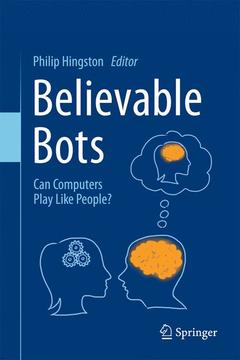Description
Believable Bots, 2012
Can Computers Play Like People?
Coordinator: Hingston Philip
Language: English
Publication date: 11-2014
318 p. · 15.5x23.5 cm · Paperback
Publication date: 10-2012
318 p. · 15.5x23.5 cm · Hardback
Description
/li>Contents
/li>Biography
/li>Comment
/li>
We share our modern world with bots ? chatbots to converse with, roombots to clean our houses, spambots to fill our e-mail inboxes, and medibots to assist our surgeons. This book is about computer game bots, virtual companions who accompany us in virtual worlds or sharpen our fighting skills. These bots must be believable, that is human players should believe they are interacting with entities operating at a human level ? bots are more fun if they behave like we do. This book shows how to create believable bots that play computer games, and it discusses the implications of making them appear human.
The chapters in this book present the state of the art in research on and development of game bots, and they also look beyond the design aspects to address deep questions: Is a bot that plays like a person intelligent? Does it have emotions? Is it conscious? The topic is inherently interdisciplinary, and the work draws from research and practice in many fields, such as design, creativity, entertainment, and graphics; learning, psychology, and sociology; artificial intelligence, embodiment, agents, machine learning, robotics, human?computer interaction, and artificial life; cognition and neuroscience; and evolutionary computing. The contributing authors are among the leading researchers and developers in this field, and most of the examples and case studies involve analysis of commercial products.
The book will be of value to graduate students and academic researchers in artificial intelligence, and to engineers charged with the design of entertaining games.
Describes many details of state-of-the-art games
Addresses significant artificial intelligence issues
Interesting for games developers and academic researchers
Includes supplementary material: sn.pub/extras
Includes supplementary material: sn.pub/extras




